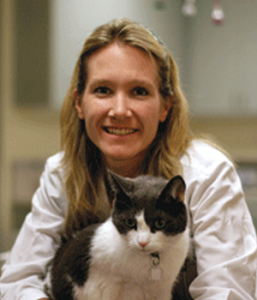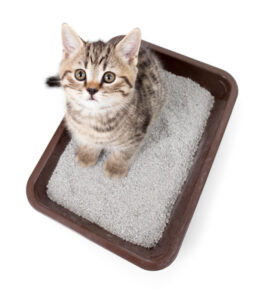-
Adopt
-
Veterinary Care
Services
Client Information
- What to Expect – Angell Boston
- Client Rights and Responsibilities
- Payments / Financial Assistance
- Pharmacy
- Client Policies
- Our Doctors
- Grief Support / Counseling
- Directions and Parking
- Helpful “How-to” Pet Care
Online Payments
Referrals
- Referral Forms/Contact
- Direct Connect
- Referring Veterinarian Portal
- Clinical Articles
- Partners in Care Newsletter
CE, Internships & Alumni Info
CE Seminar Schedule
Emergency: Boston
Emergency: Waltham
Poison Control Hotline
-
Programs & Resources
- Careers
-
Donate Now
 Lisa Maciorakowski, DVM
Lisa Maciorakowski, DVM
angell.org/generalmedicine
generalmedicine@angell.org
617-524-5653
Feline inappropriate urination is a very common issue among cats and can be a very frustrating situation for their owners. When cats urinate in undesirable locations, it is generally related to environmental factors such as dissatisfaction with their boxes or an uneasy social relationship with other household members. This problem can usually be controlled with environmental manipulations and social changes.
 Diagnosis of this behavioral issue requires ruling out medical problems first. This can be done by a visit to a veterinarian. The vet will obtain a full history, perform a thorough physical examination, and evaluate the cat’s blood work and urine. Waxing and waning signs or bloody urine is more consistent with cystitis (inflammation of the bladder). The exam will rule out a neurologic or orthopedic issue that could prevent a cat from using a litter box. The blood work can rule out metabolic conditions (diabetes, kidney disease, hyperthyroid) that could cause a cat to have increased drinking and increased urinations, which in turn can lead to urinary accidents. Evaluating the urine sample can help rule out a urinary tract infection or crystals in the urine as the underlying cause. Sometimes imaging (x-rays or ultrasound) will be done to rule out bladder stones as the culprit.
Diagnosis of this behavioral issue requires ruling out medical problems first. This can be done by a visit to a veterinarian. The vet will obtain a full history, perform a thorough physical examination, and evaluate the cat’s blood work and urine. Waxing and waning signs or bloody urine is more consistent with cystitis (inflammation of the bladder). The exam will rule out a neurologic or orthopedic issue that could prevent a cat from using a litter box. The blood work can rule out metabolic conditions (diabetes, kidney disease, hyperthyroid) that could cause a cat to have increased drinking and increased urinations, which in turn can lead to urinary accidents. Evaluating the urine sample can help rule out a urinary tract infection or crystals in the urine as the underlying cause. Sometimes imaging (x-rays or ultrasound) will be done to rule out bladder stones as the culprit.
Once a behavioral issue is confirmed, there are several strategies to help alleviate the situation. The number of litter boxes in the home is very important. There should be at least one more box than the number of cats. The boxes should be placed in several different locations and at least one on each floor of the house. The boxes should always be placed in a quiet location that is not near their food and water. This ensures that the cats are given plenty of appropriate bathroom options if they happen to find one box undesirable (guarded by another cat in the house or if there is too much commotion nearby). The boxes should be filled with unscented clumping litter that is scooped daily and cleaned out thoroughly weekly. Some cats prefer covered boxes, whereas some prefer uncovered, so a combination of both styles should be provided.
At the sites of inappropriate urination, it is important to thoroughly clean the soiled area with an enzymatic cleaner. That ensures that the cat cannot still smell the scent of urine even after the owners cannot. For a cat that is still determined to urinate in an undesirable location, a deterrent such as foil, plastic, or sheets can be placed to cover the area with the hope that the cat will not want to urinate on such a surface. Alternatively, a litter box could be placed at the cat’s new designated urinating spot and if it is used, it can then be gradually moved to a more desirable location. The product, Cat AttractTM, has been successful in some cases. It is an herbal litter supplement that often attracts cats towards the litter.
Another important aspect of controlling inappropriate urinations is minimizing any source of stress in the environment. Cats are creatures of habit and it is best to minimize any changes in their routine and limit alterations in their home. Use of the pheromone scent Feliway®, which comes in the form of a plug-in diffuser, may help relax an anxious cat.
Behavior modification techniques can also be employed in an attempt to correct this unwanted behavior. Use positive reinforcement by giving treats and affection when the cat uses the appropriate box. Avoid punishment and instead use counter-conditioning by playing or feeding at the sites of the accidents. While drugs are sometimes used in addition to the behavioral modification techniques, they are often not indicated. Even though inappropriate urinations by our feline friends often creates a strain on the relationship with their family, it is an issue that can very often be overcome when patient, dedicated owners apply the appropriate environmental and social changes.
For more information about Angell’s General Medicine Service, visit www.angell.org/generalmedicine or email generalmedicine@angell.org.